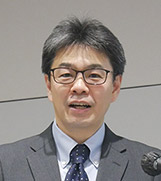R&D Projects
Good Governance Practice for Research Integrity Policies through Electric Laboratory Notebook Implementation Guidelines
Principal Investigator

- IIMURO Satoshi
Vice Director & Professor, Innovation and Research Support Center,International University of Health and Welfare
Objective
Governance for research activities by "static research integrity," that is, by research ethics education and penal rules for research misconduct, is facing some limitations. There must be two reasons. One is that we may miss the target we should work on as research integrity activities. The other is that we are trying to secure research integrity and responsibility for science by the more ethics of individual researchers.
Recently, there have been many questionable research outcomes. We, the project members, believe many of them are not due to willful misconducts but Questionable Research Practices (QRP). Quality management activities is effective for controlling QRP. This could also be called "dynamic research integrity."
Research quality control includes the following:
1) traceability, reproducibility and process control
2) identification of data and meta data for traceability and reproducibility
3) clarification of research activity processes on each laboratory
We need some paradigm shift from "static research integrity" to "dynamic research integrity." The three principles are the basis of governance for research activities.
Outline
What is the integrity and the responsibility? That is to manage the total process of research from the standpoint of both researchers and research administrators. Generally, minimum requirements to ensure traceability, reproducibility and process control are as follows:
1) Data management plan, 2) Study protocol, 3) Raw data that needs to be retained, 4) Metadata that needs to be retained, 5) Data cleaning policy and implementation record, 6) Statistical analysis plan and record (statistical programs and results), 7) Review history of results, 8) Published content
What should be recorded and managed for each item should be decided by the stakeholders. Discussion among the stakeholders is the first step for governance.
We will perform implementation experiments of electric laboratory notebook (ELN) to embody such requirements. Paper laboratory notebook had provided the evidence for research integrity. ELN will be replacing the paper one with the evolution of IT technology. However, simply introducing ELN does not lead to evidence construction for research integrity. Our project plan is below.
a) ELN implementation (researchers' viewpoints)
b) ELN implementation (research administrators' viewpoints)
c) Discussion among stakeholders
d) Validation of data traceability (and reproducibility, if possible)
e) Expansion from biological and medical researches to science and engineering research
f) Developing ELN implementation guideline as a general tool
The guideline will help you to understand and practice the "dynamic research integrity."




